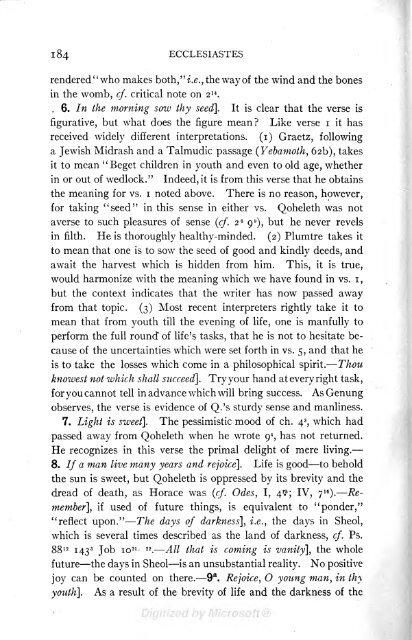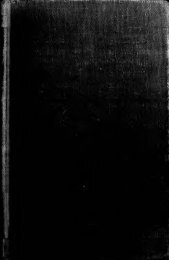Ecclesiastes - GA Barton - 1908.pdf
Ecclesiastes - GA Barton - 1908.pdf
Ecclesiastes - GA Barton - 1908.pdf
Create successful ePaper yourself
Turn your PDF publications into a flip-book with our unique Google optimized e-Paper software.
1 84<br />
ECCLESIASTES<br />
rendered/' who makes both," i.e., the way of the wind and the bones<br />
in the womb, cf. critical note on 2 14 .<br />
. 6.<br />
In the morning sow thy seed]. It is clear that the verse is<br />
figurative, but what does the figure mean? Like verse i it has<br />
received widely different interpretations, (i) Graetz, following<br />
a Jewish Midrash and a Talmudic passage (Yebamoth, 62b), takes<br />
it to mean " Beget children in youth and even to old age, whether<br />
in or out of wedlock." Indeed,<br />
it is from this verse that he obtains<br />
the meaning for vs. i noted above. There is no reason, however,<br />
for taking "seed" in this sense in either vs. Qoheleth was not<br />
averse to such pleasures of sense (cf. 2 8<br />
9 9<br />
),<br />
but he never revels<br />
in filth. He is thoroughly healthy-minded. (2) Plumtre takes it<br />
to mean that one is to sow the seed of good and kindly deeds, and<br />
await the harvest which is hidden from him. This, it is true,<br />
would harmonize with the meaning which we have found in vs. i,<br />
but the context indicates that the writer has now passed away<br />
from that topic. (3) Most recent interpreters rightly take it to<br />
mean that from youth till the evening of life, one is manfully to<br />
perform the full round" of life's tasks, that he is not to hesitate because<br />
of the uncertainties which were set forth in vs. 5, and that he<br />
is to take the losses which come in a philosophical spirit. Thou<br />
knowest not which shall succeed]. Try your hand at every right task,<br />
for you cannot tell in advance which will bring success. As Genung<br />
sense and manliness.<br />
observes, the verse is evidence of Q.'s sturdy<br />
7. Light is sweet]. The pessimistic mood of ch. 4', which had<br />
passed away from Qoheleth when he wrote 9*, has not returned.<br />
He recognizes in this verse the primal delight of mere living.<br />
8. If a man live many years and rejoice]. Life is good to behold<br />
the sun is sweet, but Qoheleth is oppressed by its brevity and the<br />
dread of death, as Horace was (cf. Odes, I, 4 1 ; 5<br />
; IV, y 16<br />
).<br />
member], if used of future things, is equivalent to "ponder,"<br />
"reflect upon."- The days of darkness], i.e., the days in Sheol,<br />
which is several times described as the land of darkness, cf. Ps.<br />
88 12<br />
i43 3<br />
Re-<br />
Job io 21 22 . All that is coming is vanity], the whole<br />
future the days in Sheol is an unsubstantial reality. No positive<br />
joy can be counted on there. 9a . Rejoice, O young man, in thy<br />
youth]. As a result of the brevity of life and the darkness of the





